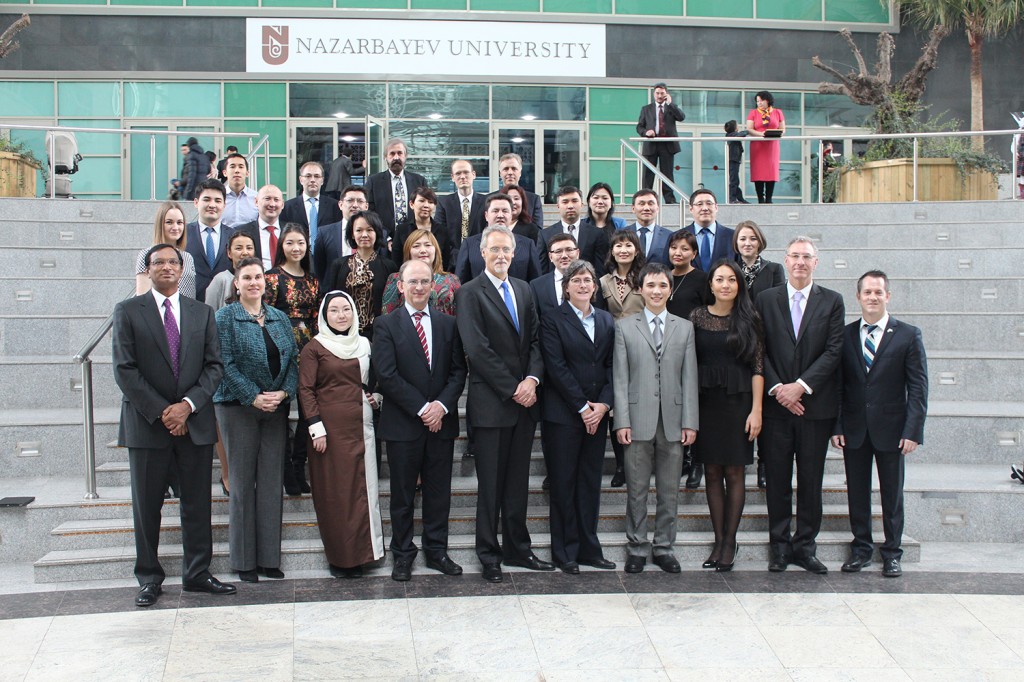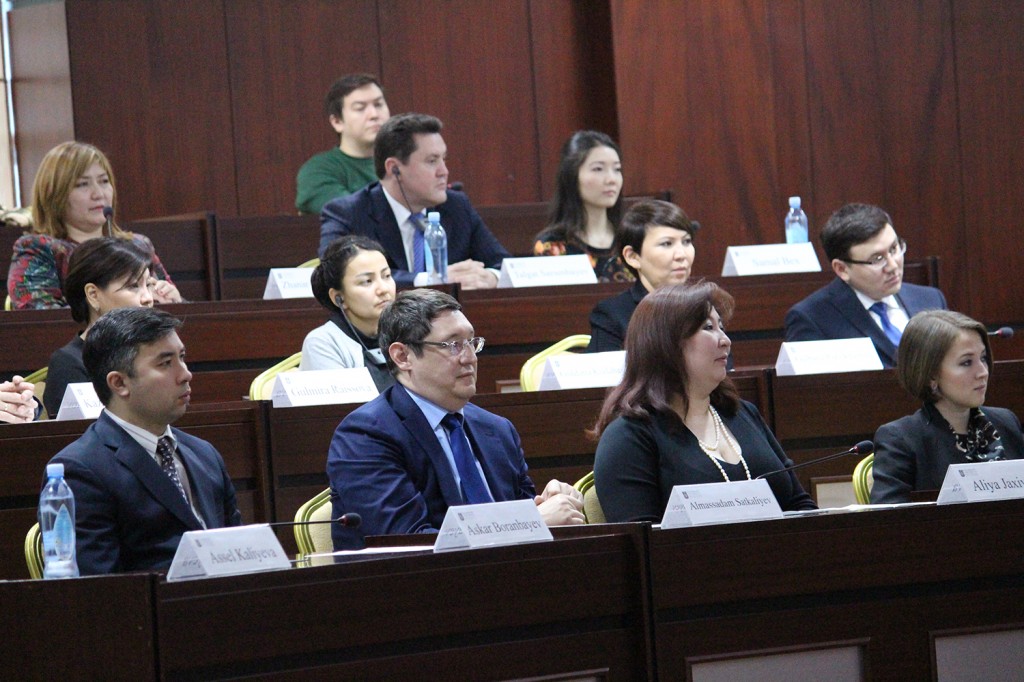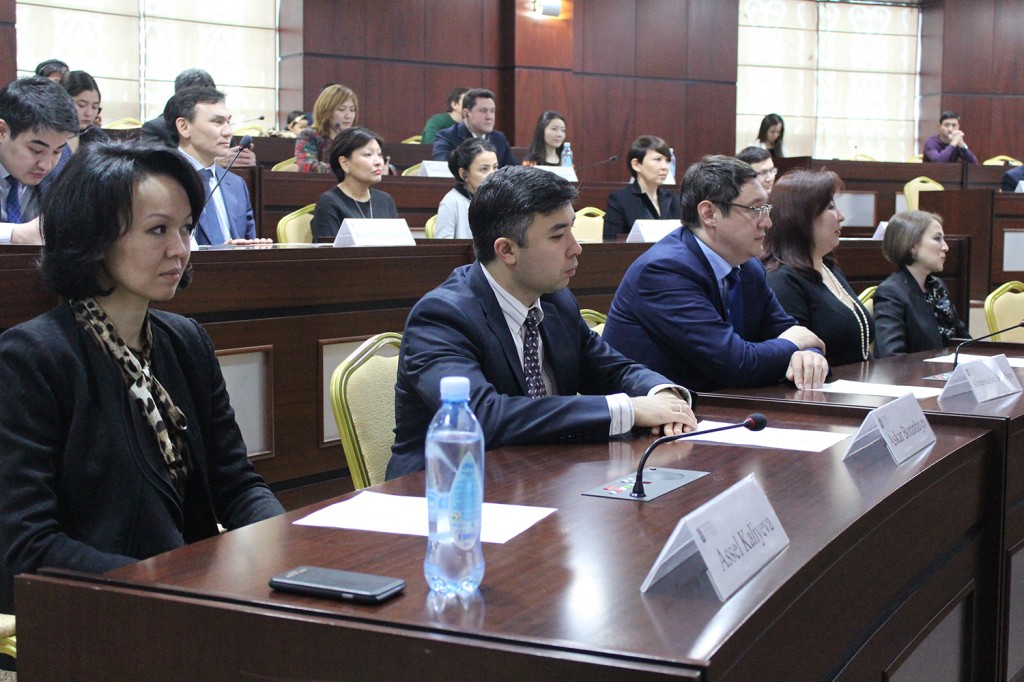ASTANA – Nazarbayev University’s Executive Master of Business Administration (EMBA) programme attracts middle and upper-level managers with its Duke University strategic collaboration and convenience to Astana. But perhaps its biggest impact will come not through the network and the hard data it offers students, but from changing their thinking about building relationships and creating corporate culture.
How to foster relationships is one of the most important things Kazbek Aubakirov, vice president of manufacturing at Heartstitch, took away from the programme. Aubakirov was in the EMBA’s first cohort and graduated in November 2014. “Before, I was very much business oriented: ‘Let’s cut to the chase, here are my questions, this is what I need, here is my position, what is yours?’ It doesn’t always work that way, and I had not put a lot of value on getting to know the other party, or getting to know myself, for that matter, because self-awareness was not something I valued a lot. So that was the number one. I began to ask questions – not related to the matter at hand, but in an effort to learn about the other party,” he told this newspaper in an interview on May 13.
“That’s not to say that we didn’t have a lot of math and finance, of course … this, of course, was a huge body of knowledge; very practical, very applicable. And maybe to some people that came first – to me, that came second. First was myself, and learning about other people,” he said.
The EMBA is designed for professionals with at least five years work experience, though Patrick Duparcq, associate dean for executive programmes, pointed out in an interview that 25 percent of this year’s cohort have 20 years or more experience. These big players in Kazakhstan’s business circles are drawn by the prospect of studying under professors from Duke University, the EMBA’s strategic partner, Assistant Dean of Marketing Richard Castleberry said on April 30. But they’re also drawn to the networking possibilities they create. “Of course, one of the main factors for this particular programme is the extremely high quality network of contacts.” And these are regional and local contacts, he points out, far more relevant than establishing a high level network an ocean away.
“Everyone who’s ever worked in top business school understands that 50 percent or 40 percent of the value you get out of the programme is what the guy or the woman in front is saying. Fifty to 60 percent is the network,” said Duparcq.
For some graduates, the actual network is coming second to the concept of developing relationships and positive business cultures. Gani Nygymetov, president of the Centre for International Programmes, which works with the Bolashak scholarship programme, was also in the first EMBA cohort. “Some of the courses that I took, like organisational management, when we studied about corporate culture, about the work environment, it completely changed my mind,” he said May 14.
“I think we need to train more managers in Kazakhstan in such programmes,” Nygymetov said. “Many managers in Kazakhstan, they are self developed. … They became managers by doing. They didn’t learn how to become managers. So now … they need to upgrade, systematise what they know.”
Management, he learned, is about building good teams, inspiring people and creating emotional investment, he said. And for that, communication is crucial – but polite, professional communication is not yet a given in the workplace in Kazakhstan. Even within the Bolashak programme, Nygymetov said, communication between bosses and subordinates could be extremely formal, command-driven, and verge on disrespectful. So, when he first began his new job, he followed one of the case studies the EMBA presented to make some changes.
“I wrote an email, similar to one of our case studies. I said, I’m new to this company, but I think we need to change some things here…. I will lead by example. I put forward the slogan, ‘We are Polite and Professional.’ Everyone wants to be professional. But if you are polite, it doesn’t mean you are not professional. You are even more professional if you’re polite. … People responded to my email. They said, we need this idea. We needed something like this.”
Importantly, CEO-level managers from his cohort are implementing ideas from the EMBA, Nygymetov said. “You can have an actual, practical impact if you are a CEO. If you understand that this knowledge is very good, you can actually change, the next day. You can change the company. … And actually, these are people who, in some sense, affect the economy [of Kazakhstan]. … If this is how people are educated, then the country will be better, because these people are making decisions over millions.”
One of the high-level graduates of the EMBA programme is Almassadam Satkaliyev, CEO of Samruk Energy, a national company that employs around 24,000 people and accounts for nearly half of Kazakhstan’s energy capacity. He said he was drawn by the opportunity to renew his knowledge base and recharge himself. What was also really useful, he said, was the chance to put local business visions and strategies into a global context.
“[It] provides a unique opportunity to understand your vision – to see if you’re right or not, what weaknesses your strategies have, what problem you will face if, for example, you set new goals for your company,” he said, particularly new goals involving new practices in governance, human resources management or other business practices, he said on May 14.
Having access to world-class business educations is key to Kazakhstan’s transformation, the CEO said. “It’s a critical issue, I think, for our country to take the next step in the liberalisation of its economy, the transformation of business processes, because without having this knowledge, all decisions are based only on our own experience, on approaches based on short-term benefits. Now we need these kinds of changes in mentality. During this course, many participants really changed their vision. Some became new people!”
An education like the EMBA offers should be a prerequisite for promotion in government and national companies, he said, particularly for more senior business people. “A lot of managers in Kazakhstan still have only a Soviet type of education,” Satkaliyev said. “It’s a different type of understanding of decision making – for this group, the EMBA is critical. Teach them!”
The programme is attracting interest from all over Kazakhstan and beyond, including other Central Asian countries, Castleberry reported. This interest, and the willingness of Kazakhstan’s executives to continue learning, bodes well for the country, according to Duparcq.
“I have so much respect for these people; it’s so courageous,” he said. “You go to visit them in their offices … and they’re the chairman of the board or the CEO, and they’ve got a big office, with huge couches and a beautiful desk and half a dozen people to [wait on] them – and they come here and they’re willing to do team building exercises.”
This humility is a harbinger of success, Duparcq said. “If you can find enough people like that, who are willing to get out of their comfort zone and say, you know what, I want to be at the world’s level, and if it takes me crawling through the mud while I’m the CEO to do it, I’ll do it. To me, those are the people who get my respect. If you don’t have that in a culture… how are you going to change anything?”





